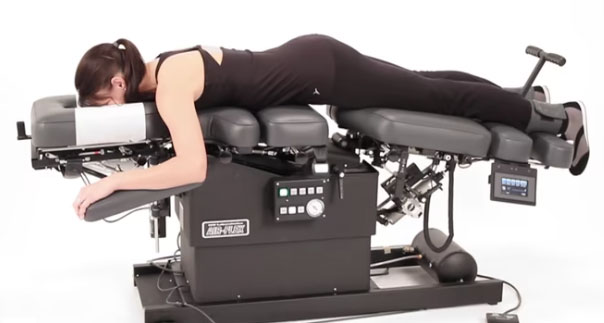
As we get older, we all experience the occasional ache or pain. Sometimes it happens after an intense workout session. Other times, we wake up in the morning and have achy knees for no discernable reason. These pains, usually referred to as acute pains, are common and often dissipate.
Chronic pain, on the other hand, is a very different beast. It's experienced by nearly 1/3 of Americans at some point in their lives and can be transmitted to the brain even after an injury is healed. Suffering from chronic back, knee, spine, neck, foot, and other types of pain doesn't just hurt - it can be debilitating and life-changing.
Yes, chronic pain is a physical sense that can result in pounding headaches, burning neck pain, and searing joint pain. But chronic pain is more than physical - it's also stressful, bothersome, and all-encompassing. It causes normal men and women to become reclusive, depressed, and unable to enjoy life's pleasures. If you're suffering from the fallout of chronic pain, you might feel like all hope is lost. But the doctors and specialists at Texas Nerve and Spine are here to tell you that living with chronic pain isn't inevitable.
In fact, chronic pain relief in Foster, TX, is more achievable than you might think, and it doesn't have to involve harmful surgeries or addictive pain medications.

At our nerve and spine clinic in Texas, we have a simple philosophy: Treat every patient the same way that you would treat your parent, spouse, or child if they were patients at Texas Nerve and Spine. As a family-owned and operated institution, that's just the way we do business. While some spine and nerve pain clinics focus solely on monetary transactions and ROI, we prefer to put our patients' needs first before anything else. And that, in a nutshell, is what sets Texas Nerve and Spine apart from all the others.
We supplement our patient-first philosophy with innovative chronic pain and nerve disease treatments. Our therapies restore our patients' health while correcting the underlying causes of their spine and nerve issues without relying on damaging pharmaceutical drugs or expensive, invasive surgeries.
It all starts with our unique Brain to Body system - a cutting-edge approach developed specifically for people with chronic pain and nerve diseases. This system helps treat patients suffering from a wide range of conditions, including:

If you're in search of an expert panel of nerve and pain doctors who provide lasting relief and world-class therapies for nerve diseases and chronic pain, our team is here to serve you.

To reverse chronic pain and/or nerve disease, areas of the body that have become weak due to disease or injury must be strengthened. This includes your brain, nerves, muscles, blood vessels, and cells. Our experts here at Texas Nerve and Spine developed the most advanced pain and nerve therapy system to do all of this and more, and we call it the Brain to Body System.
From fibromyalgia and disc herniations to diabetic neuropathy and sciatica, our Brain to Body System helps restore your health and corrects the causes of your problems. Unlike treatments from other nerve and spine clinics, our system provides long-term relief without relying on invasive surgeries or dangerously addictive pharmaceutical medications.
To understand how our Brain to Body System solves chronic pain and similar conditions like nerve disease, you need a basic knowledge of the conditions themselves. That way, you can understand why so many who suffer from them rarely improve.

This is a type of pain that does not get better on its own or that doesn't alleviate after traditional medical treatments or prescription pain meds.

This is a type of pain that does not get better on its own or that doesn't alleviate after traditional medical treatments or prescription pain meds.
Chronic pain from nerve diseases and serious injuries causes a domino effect within your body. It starts with inflammation, which leads to decreased blood supply. This reduced blood supply results in a lack of oxygen. When your body doesn't get enough oxygen, it loses crucial nutrients that your body needs. This progressive effect often leads to long-term problems such as:
But with Texas Nerve and Spine's Brain to Body system, patients suffering from chronic pain and nerve disease build strength through rehabilitation. This advanced system helps:
Our Brain to Body System is central to our approach to chronic musculoskeletal pain relief and chronic nerve pain relief in Foster, TX. By following the Brain to Body system, we can provide several services to patients suffering from chronic pain and nerve damage.
Here's a fact you might not know: Breathing in higher levels of oxygen than you normally take in actually helps improve your health. Also called EWOT, exercising with oxygen is a technique that increases oxygen circulation at a much more rapid pace than oxygen therapy alone. Create New Blood Cells
At Texas Nerve and Spine, our doctors use the NuStep Recumbent Cross Trainer to help achieve the aforementioned benefits. This specialized machine trains your muscles, brain, and nerves to work together, which supports your body's healing processes. While using the NuStep Recumbent Cross Trainer, patients are hooked up to an oxygen generator to enjoy the benefits of EWOT and reach their chronic pain relief goals.
When you oxygenate your blood with EWOT, it can have amazing benefits that can:

Many patients who visit Texas Nerve and Spine are suffering from an injury or disease of the vertebral discs of their spine. It requires the right kind of care from highly specialized doctors. If you're in search of a safe, gentle, controlled treatment for back and spinal pain, Flexion Distraction therapy may be for you.

Finding relief for this type of condition and pain is often easier said than done. Fortunately, relief is right around the corner at Texas Nerve and Spine. Our Flexion/Distraction Table stretches the spine safely and gently, allowing injured tissue and damaged discs the chance to heal and become hydrated, which lets the affected area recover more effectively and efficiently.
Patients looking for chronic back and neck pain relief in Foster, TX choose Flexion/Distraction therapy because it:
With more than 50 million adults in America suffering from chronic pain, it makes sense that most of them want a solution that doesn't require pain medication or harmful surgery. That's where laser therapy from Texas Nerve and Spine comes into play. Laser therapy has been used for therapeutic purposes in medical environments for years. In fact, it is FDA-approved and backed by more than 2,500 research studies, which have demonstrated its efficacy in chronic musculoskeletal pain relief in Foster, TX.
Though laser therapy is a common treatment option, not all lasers are the same. Our Class IV laser therapy, used in all applicable programs, is the most efficacious and powerful laser available for tissue healing and regeneration and healing. Class IV lasers use photobiomodulation, which provides excellent results for Musculoskeletal disorders. This process has also been proven to help with other various conditions that cause chronic pain, such as sciatica, carpal tunnel syndrome, low back pain, shoulder pain, and much more.
Our chronic pain patients choose laser therapy from Texas Nerve and Spine because it:

When your motor functions are limited or non-existent due to a serious injury or surgery, it can ruin your life. You lose the ability to be independent - one of the hallmarks of being human. Fortunately, with motor function re-training at Texas Nerve and Spine, patients suffering from motor function issues have a light at the end of the tunnel. This type of specialized physical therapy helps people recover from injuries or surgeries that leave their motor functions lacking. The goal of motor function re-training is to regain coordination and strength in the areas affecting the patient.
Motor function re-training therapy is a crucial part of the motor function rehabilitation process because it helps patients regain the independence they lost. Perhaps equally important, it also helps them return to their original level of motor function or better.

Based on our Brain to Body system, our specialists design custom exercise programs based on our patient's motor function needs. Depending on the type of injury and lack of motor skills associated with it, we may also use electrical stimulation and other modalities for more effective treatment and recovery.
Motor function re-training provides many benefits for affected patients, including:
Myofascial Release therapy gives patients chronic pain relief in Foster, TX, and boosts joint mobility by loosening up restricted, tight muscles. Though there are similarities to traditional massages, myofascial release therapy focuses on soft tissues and the muscular system in your body to relieve tension and stress on muscles.
Restricted muscles have reduced blood flow and less oxygen. When this happens, it leads to limited movement and pain that is often intense. Our program uses state-of-the-art technology to apply acute, high-velocity vibration directly to the affected tissue to provide the patient with the environment necessary to increase mobility which, over time, can exponentially reduce pain
Benefits of this type of treatment include:

As is the case with any spinal cord injury, the nerves around the spine get weak. When this happens, pain develops, and recovery is halted. Suppose you're searching for a safe, effective way to deal with a painful spine issue like sciatica or a herniated disc. In that case, neuro impulse therapy is a great chronic nerve pain treatment in Foster, TX. Unlike common chiropractic treatments, this advanced therapy does not involve any "cracking" or significant adjustments.

Any type of injury can cause dysfunction and weakness in your brain. To improve cognition and the neurological connection between the brain, the muscles, and the nerves, some injured patients choose to undergo interactive neurocognitive therapy using our neuro activation wall. Our neuro activation wall retains, strengthens, and restores proper function to the brain and nervous system without relying on medications or outlandish therapies.
Texas Nerve and Spine patients choose neuro activation wall therapy because it:
As is the case with any spinal cord injury, the nerves around the spine get weak. When this happens, pain develops, and recovery is halted. Suppose you're searching for a safe, effective way to deal with a painful spine issue like sciatica or a herniated disc. In that case, neuro impulse therapy is a great chronic nerve pain treatment in Foster, TX. Unlike common chiropractic treatments, this advanced therapy does not involve any "cracking" or significant adjustments.
Neuro Impulse Therapy works by using very specific impulses directed at the area causing pain. These targeted impulses send a signal to your body so that it can begin healing and repairing your body naturally. Benefits of this therapy include:

Peripheral neuropathy occurs when there is a lack of blood flow to the nerves in areas like your feet and hands. When these nerves are devoid of blood, they begin to decay and degenerate because they don't have enough oxygen or nutrients. Eventually, the nerves in your body shrivel up, causing pain, numbness, balance problems, and other painful symptoms.
Our Brain to Body program works wonders for neuropathy issues like these by using state-of-the-art technology like laser therapy and personalized, strategic plans of action created around our patient's needs. If you're looking for both short and long-term pain relief from peripheral neuropathy, this could be the solution you need.

Spinal conditions range in severity from barely noticeable to absolutely crippling. To get to the bottom of your spine conditions, our team uses X-Rays to pinpoint the location of your spine's disease. From there, we craft a custom rehabilitation program that addresses the underlying causes of your spine pain. Often, part of that therapy includes spinal decompression.

Spinal decompression works by gently stretching the spine. When the spine is stretched, it changes its position. This change relieves pressure off the discs in your spine, which act as cushions in your back. By creating negative pressure, herniated and bulging discs retract, giving the nerves and structures in your back relief. This relief sends nutrient-rich fluids and oxygen to the discs in your back so they can heal properly.
Chronic pain can be debilitating. But it doesn't have to be permanent. Your journey to a pain-free life starts with a simple four-step process at Texas Nerve and Spine:
 832-979-5117
832-979-5117
At Texas Nerve and Spine, our doctors understand that true back and chronic nerve pain relief in Foster, TX won't happen until we can uncover the underlying causes of your pain. To do so, our specialists will perform detailed exams and review your medical history to understand the full scope of your needs. That way, we can craft a personalized treatment plan to provide long-term relief for your chronic pain.
Once we have discovered the underlying reasons for your painful condition, it's time to get to begin healing. Our team will work together to create a customized therapy program designed exclusively for you and your body.
Once our team develops your own custom plan for healing, we'll use our experience and resources to provide you with your plan of care. This plan will be based on your needs and our Brain to Body system, giving you the relief you deserve in a natural manner.
Chronic pain relief cannot be accomplished without a tested pain relief system and a purpose-driven team that supports your recovery. That's why our expert staff will assess your journey to recovery and be there for support every step of the way. Because when you treat chronic pain at Texas Nerve and Spine, you're never alone.
Contact our office today to get started on your journey to a pain-free life.

